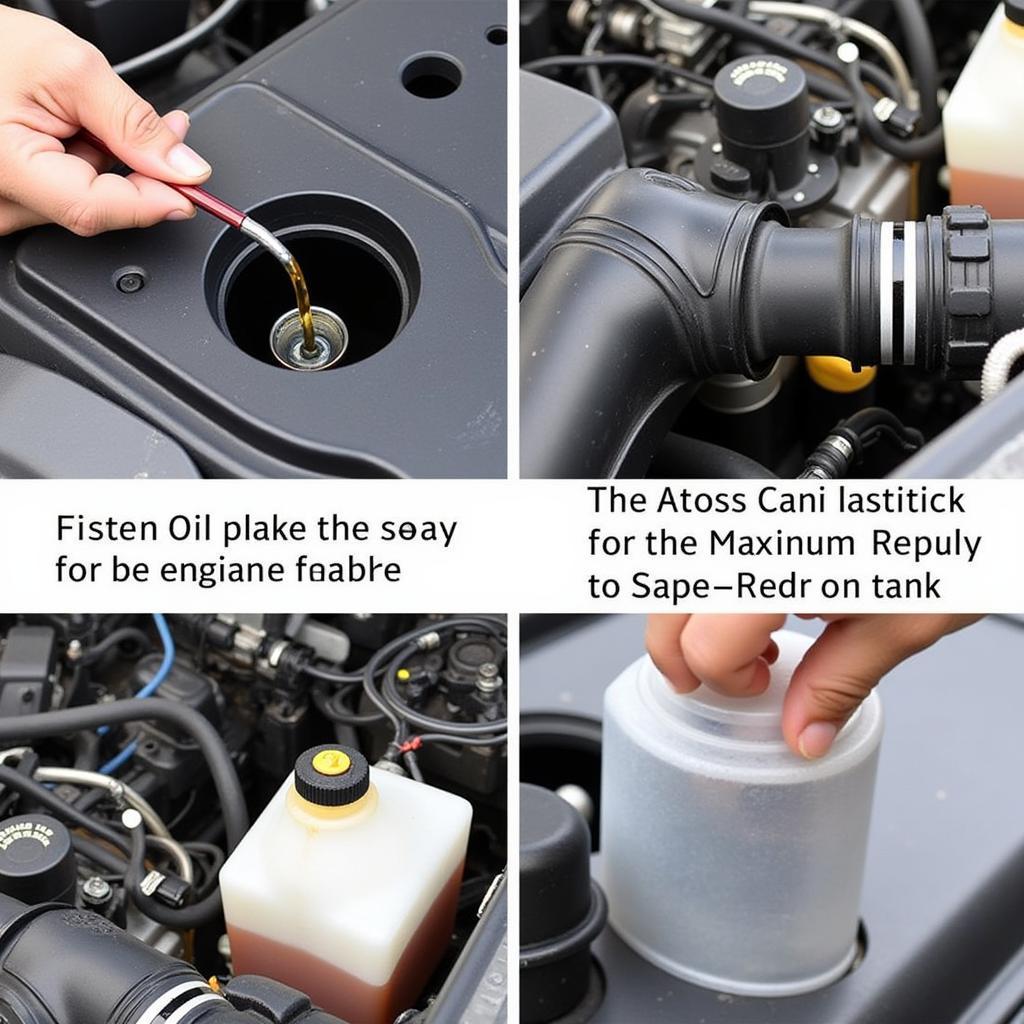Basic car maintenance is crucial for vehicle longevity, safety, and performance. Understanding a few key maintenance tasks can save you money, prevent breakdowns, and keep your car running smoothly for years to come. This guide will cover the essential car maintenance every car owner should know.
Keeping your car in tip-top shape doesn’t require a mechanic’s certification. A little knowledge and some elbow grease can go a long way. Knowing basic car maintenance also empowers you to make informed decisions when dealing with professional mechanics. Are you looking for ways to streamline your car maintenance schedule? Check out the best app for car maintenance schedule.
Essential Fluids and Checks
Regularly checking and changing your car’s fluids is the cornerstone of basic car maintenance. This includes checking your engine oil, coolant, brake fluid, power steering fluid, and transmission fluid. Each fluid plays a vital role in your car’s operation, and neglecting them can lead to serious problems.
How to Check Your Engine Oil
Use the dipstick to check your oil level. Wipe it clean, reinsert it fully, and then withdraw it again to check the level. Ensure the oil level is between the minimum and maximum marks. The oil should also be a light brown color. If it’s dark and gritty, it’s time for an oil change.
Why is Checking Coolant Important?
Coolant prevents your engine from overheating. Check the coolant level in the reservoir tank and ensure it’s within the designated range. Never open the radiator cap when the engine is hot.
 Checking Engine Oil and Coolant levels in a car
Checking Engine Oil and Coolant levels in a car
Brake Fluid, Power Steering Fluid, and Transmission Fluid Checks
These fluids are equally important. Check their levels according to your car’s owner’s manual. If you notice any leaks or unusual colors, consult a mechanic immediately.
Tire Maintenance: More Than Just Air Pressure
Proper tire maintenance is crucial for safety and fuel efficiency. Check your tire pressure regularly using a reliable gauge. Properly inflated tires improve handling, fuel economy, and tire lifespan.
How Often Should I Check My Tire Pressure?
Check your tire pressure at least once a month and before long trips. Don’t forget to check the spare tire as well. The recommended tire pressure can usually be found on a sticker inside the driver’s side door jamb or in the owner’s manual.
The Importance of Tire Rotation
Rotating your tires helps ensure even wear and extends their life. Consult your owner’s manual for the recommended rotation pattern and frequency.
Basic Car Maintenance Schedule: Staying Ahead of Problems
Following a regular maintenance schedule is the best way to prevent costly repairs and keep your car running smoothly.
Creating a Personalized Maintenance Schedule
While your owner’s manual provides a general maintenance schedule, creating a personalized schedule based on your driving habits and climate is essential. If you own a Kia, consider using a dedicated app to help manage your maintenance. Explore more about the kia car maintenance app.
Key Maintenance Intervals
Some key maintenance intervals include oil changes every 3,000-5,000 miles, air filter replacements every 12,000-15,000 miles, and spark plug replacements every 30,000-100,000 miles. However, these intervals can vary depending on your vehicle and driving conditions.
Lights and Wipers: Essential for Visibility and Safety
Maintaining proper visibility is crucial for safe driving. Regularly check your headlights, taillights, brake lights, and turn signals. Replace any burned-out bulbs immediately.
Wiper Blade Maintenance
Worn-out wiper blades can significantly reduce visibility in inclement weather. Replace them every six months to a year or as needed.
“Regular maintenance is not just about keeping your car running, it’s about ensuring your safety on the road,” says John Smith, Automotive Engineer at Autotippro.
Basic Car Maintenance: A Summary
Basic car maintenance is within reach of every car owner. By understanding these simple checks and following a regular maintenance schedule, you can keep your car running smoothly, prevent costly repairs, and ensure your safety on the road.
“Remember, preventative maintenance is always cheaper than reactive repairs,” advises Sarah Johnson, Lead Mechanic at Autotippro.
Basic car maintenance, as described above, is an investment in your vehicle’s longevity and your peace of mind. We encourage you to connect with us at Autotippro for any assistance you may need. You can reach us at +1 (641) 206-8880 or visit our office at 500 N St Mary’s St, San Antonio, TX 78205, United States.
FAQ
- How often should I change my oil? Generally, every 3,000-5,000 miles, but consult your owner’s manual for specific recommendations.
- What should I do if my check engine light comes on? Get your car diagnosed by a mechanic as soon as possible.
- How can I tell if my tires need to be rotated? Uneven wear patterns on your tires indicate a need for rotation.
- Is it necessary to change my air filter regularly? Yes, a clean air filter improves fuel efficiency and engine performance.
- What type of coolant should I use in my car? Consult your owner’s manual for the recommended coolant type.
- How can I extend the life of my car battery? Avoid leaving lights on when the engine is off and have the battery tested regularly.
- What are the signs of worn-out brake pads? Squealing or grinding noises when braking are common indicators.
“Taking care of your car is a small price to pay for the safety and reliability it provides,” reminds David Wilson, Senior Technician at AutoTipPro.






Leave a Reply